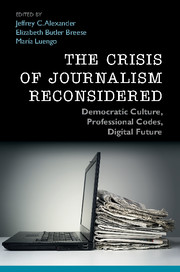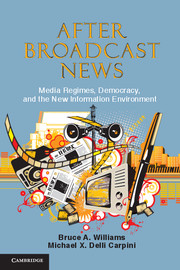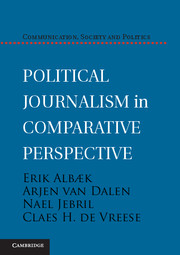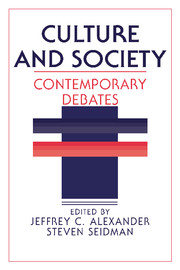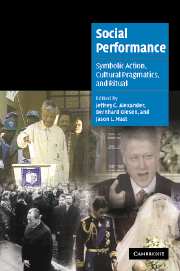The Crisis of Journalism Reconsidered
Democratic Culture, Professional Codes, Digital Future
$41.99 (G)
- Editors:
- Jeffrey C. Alexander, Yale University, Connecticut
- Elizabeth Butler Breese, Panorama Education
- Marîa Luengo, Universidad Carlos III de Madrid
- Date Published: June 2016
- availability: Available
- format: Paperback
- isbn: 9781107448513
$
41.99
(G)
Paperback
Other available formats:
Hardback, eBook
Looking for an examination copy?
This title is not currently available for examination. However, if you are interested in the title for your course we can consider offering an examination copy. To register your interest please contact [email protected] providing details of the course you are teaching.
-
This collection of original essays brings a dramatically different perspective to bear on the contemporary 'crisis of journalism'. Rather than seeing technological and economic change as the primary causes of current anxieties, The Crisis of Journalism Reconsidered draws attention to the role played by the cultural commitments of journalism itself. Linking these professional ethics to the democratic aspirations of the broader societies in which journalists ply their craft, it examines how the new technologies are being shaped to sustain value commitments rather than undermining them. Recent technological change and the economic upheaval it has produced are coded by social meanings. It is this cultural framework that actually transforms these 'objective' changes into a crisis. The book argues that cultural codes not only trigger sharp anxiety about technological and economic changes, but provide pathways to control them, so that the democratic practices of independent journalism can be sustained in new forms.
Read more- The contributions are original, researched and well-written, so readers will engage with a new argument on the contemporary crisis of journalism
- Ranges both historically and cross-nationally to put the 'crisis of journalism' in a longer-term perspective
- By offering a conceptual and empirical evaluation of recent changes in journalism, the book offers a distinct perspective and analysis
Reviews & endorsements
"This book offers an extraordinarily useful and significant contribution to scholarly debate about the future of journalism by reflecting on the too often missed cultural component in explanations of the current crisis facing news, democracy and journalism in an age of digital media. Reflective and enviably well written, it is essential reading for everyone interested in the ways in which the digital future is unravelling."
Bob Franklin, University of CardiffSee more reviews"The never-ending technological and economic journalism crises are addressed in this edited book in a profound, multidimensional and critical manner. It is a fundamental piece to comprehend present-day social and cultural deadlocks and to shed light on the imaginable futures of democratic practices."
Helena Sousa, University of Minho"Consistently provocative and original, The Crisis of Journalism Reconsidered is a must-read for anyone interested in media and democracy."
Ronald Jacobs, State University of New York, Albany, and author of The Space of Opinion: Media Intellectuals and the Public Sphere'This collection proves that a discussion about journalism’s democratic function and performance is not something that should be left merely to practitioners, technology experts or academic mini-publics. Its advantage is that it opens a new space for discussion, and it is a new start that allows for a change of perspective.' Andreas Hess, The Irish Times
'The Crisis of Journalism Reconsidered is a thoughtful volume arriving at an opportune time to address important developments in journalism studies and in its object of concern … It is exceedingly well-written and organized. Its theoretical richness and distinctive take on the landscapes of both journalism and journalism studies position it as a novel contribution that will fuel much reflection on the issues it raises. It reminds us, ultimately, that journalism is anchored by its normativity. In an age when hope for journalism seems to be in short supply, this book comes at the right time.' Ryan J. Thomas, Journalism
'… hats off to the editors and the contributors for this fine attempt at contextualizing the shrinking, information-rich world. Summing Up: Highly recommended. Upper-division undergraduates through faculty.' CHOICE
Customer reviews
Not yet reviewed
Be the first to review
Review was not posted due to profanity
×Product details
- Date Published: June 2016
- format: Paperback
- isbn: 9781107448513
- length: 328 pages
- dimensions: 226 x 152 x 20 mm
- weight: 0.46kg
- contains: 5 b/w illus. 4 tables
- availability: Available
Table of Contents
Part I. Introduction:
1. Journalism, democratic culture, and creative reconstruction Jeffrey C. Alexander
Part II. The Crisis Narrative:
2. The perpetual crisis of journalism: cable and digital revolutions Elizabeth Butler Breese
3. The crisis of public service broadcasting reconsidered: privatization and digitalization in Scandinavia Hakon Larsen
4. Beyond administrative journalism: civic skepticism and the crisis in journalism Daniel Kreiss
5. The many crises of Western journalism: a comparative analysis of economic crises, professional crises, and crises of confidence Rasmus Kleis Nielsen
6. The crisis in news: can you whistle a happy tune? Michael Schudson
Part III. Fears of Digital News Media: The Symbolic Struggle:
7. When codes collide: journalists push back against digital desecration María Luengo
8. Telling the crisis story of journalism: narratives of normative reassurance in Page One Matt Carlson
9. Assembling publics, assembling routines, assembling values: journalistic self-conception and the crisis in journalism C. W. Anderson
10. The constancy of immediacy: from printing press to digital age Nikki Usher
11. News on new platforms: Norwegian journalists and entrepreneurs face the digital age Kari Steen-Johnsen, Karoline Andreas Ihlebaek and Bernard Enjolras
Part IV. Professional Journalism, Civil Codes, and Digital Culture:
12. Journalism in American regional online news systems David Ryfe
13. Digital media and the diversification of professionalism: a US-German comparison of journalism cultures Matthias Revers
14. Professional and citizen journalism: tensions and complements Peter Dahlgren
15. Expressions of right and wrong: the emergence of a cultural structure of journalism Stephen F. Ostertag
Part V. Conclusion:
16. News innovations and enduring commitments Elizabeth Butler Breese and Mara Luengo.
Sorry, this resource is locked
Please register or sign in to request access. If you are having problems accessing these resources please email [email protected]
Register Sign in» Proceed
You are now leaving the Cambridge University Press website. Your eBook purchase and download will be completed by our partner www.ebooks.com. Please see the permission section of the www.ebooks.com catalogue page for details of the print & copy limits on our eBooks.
Continue ×Are you sure you want to delete your account?
This cannot be undone.
Thank you for your feedback which will help us improve our service.
If you requested a response, we will make sure to get back to you shortly.
×
